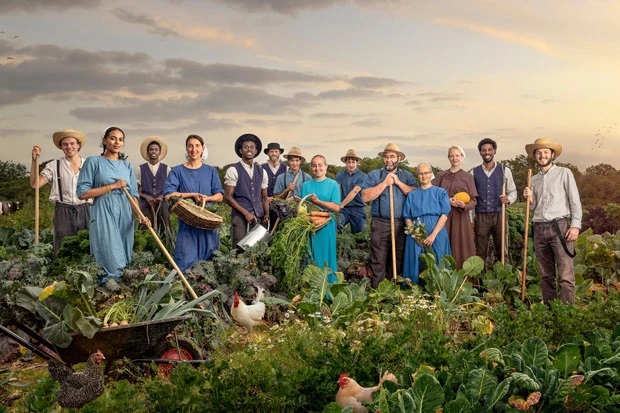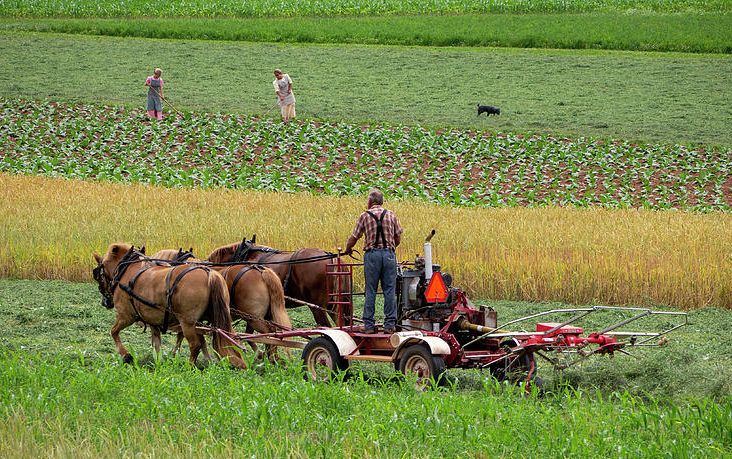A journey into the past – life lessons from the Amish
Technology and other modern conveniences have become so ingrained in our daily lives that most people can hardly live without them. This is not the case with the Amish, as they still live largely as they did 300 years ago.

Their lifestyle, which prohibits the ownership of computers and relies only in limited cases on electricity for business, may bring unnecessary hardships. But there are significant benefits to living in harmony with your community – without dependence on anyone or technology.
The DW documentary Life of the Amish in the USA describes how “encountering the Amish is like a trip into the past” and why this can be a very wise move in today’s world.
No reliance on amenities that could one day disappear
There are around 370,000 Amish people living in the USA, mainly in Indiana, Pennsylvania and Ohio. The way of life of different communities differs slightly, with some groups foregoing electricity altogether while others do not, among others. However, the core of being Amish is self-reliance, rejection of most technological advances and devotion to community.
Since there are no cars, most Amish people travel by horse-drawn cart. Others hire taxis or use e-bikes to travel distances too far for horses. There’s also a notable absence that would be foreign to most modern families – no computers, cell phones, internet or virtual communication networks in the house.
Chester and his family, who appear in the film, live according to the old Amish order. The word “order” describes a set of rules that dictate their way of life. In addition to eschewing technology and using only batteries and generators, the family heats their home with wood from a nearby forest and uses an old-fashioned washing machine to clean their clothes. This is anything but annoying, but rather contributes to their well-being. says Chester:
“Even during covid and all the turmoil that has occurred around the world, we have been able to maintain a way of life that promotes inner peace. And I don’t think that’s possible when you’re always, 24/7, when you’re completely connected to virtual communication networks and the outside world. Even companies that are completely on instant communication – that’s great for a company, I understand – but I’m so glad I can step away from that. And that’s how I keep my sanity.”
For many, it is difficult to imagine life without modern conveniences such as electricity, computers and cell phones. But it is wise to pay attention as the Great Reset unfolds around us. During the covid-19 pandemic, a common motto has been chanted by world leaders: A Great Reset is necessary to overcome the crisis and create a new, sustainable future.
This future is led by a powerful global cartel that wants to gain control of society and ultimately humanity. To that end, resources that currently seem inalienable – such as the right to grow your own food and maintain control over your financial assets – may one day disappear. If you can’t survive without it, you lose all autonomy and are at the mercy of those in power.
Growing your own food helps protect your freedom
Whoever controls the food supply also controls the population. The Amish have done everything right in this area too, because they produce the majority of their own food. Lloyd and Edna Miller, who run their farm with 50 dairy cows using solar energy, are among them.
Edna uses her e-bike to visit a grocery store once a week and only buys what they don’t grow on the farm. The ability to support oneself is important not only to the Millers, but to the entire Amish community, says Lloyd:
“When covid hit, a lot of people panicked. People aren’t even sure where their food comes from now. And these are real problems, by and large we could be self-sufficient for quite a long time, predominantly within the group. Within the group of people we know personally, we could survive for quite a long time without any outside input.”
Growing as much food as possible is a principle that everyone can live by. You could invest in a greenhouse, plant an orchard, or move to a rural area where you can raise chickens. Any additional level of self-sufficiency you can create will provide you with more protection.
The globalists, for example, have long had a monopoly on the grain industry with their patented genetically modified organisms (GMOs). A similar trend can now be observed with counterfeit food. The globalists are seeking to replace animal agriculture with lab-grown meat and even insects, which will allow private companies to control the entire food supply. However, those who are able to grow their own food cannot be controlled.

Investing in real elements like land and buildings is also a smart move and an area where the Amish excel. Although any type of formal education ends after the 8th grade, many in the Amish community own and run successful businesses, including blacksmith shops and bakeries.
“The Amish are very business-oriented, small businesses, you know. Small family businesses run by families or friends, and we work together as a team,” Pennsylvania native Tom Berer says in the film.
Community and family life before technology
Another principle that is deeply rooted in the Amish community is self-reliance and the pursuit of the good of the whole. “It means setting aside your individual, selfish desires and doing what’s good for the community,” says Chester, adding:
“Our culture doesn’t like relying on government help. So we don’t want to accept charity. We don’t pay into social security. We also do not receive any social benefits. We don’t get Medicaid or Medicare, but we do have a few church or community-funded programs in our community, all of which are not-for-profit.
So I personally pay in about $200 every month, and that gives me basic coverage of up to $100,000 a year, just for my family.”
To fund a $50,000 surgery for a 10-year-old Amish boy, the community also came together: more than 250 people donated, exceeding the goal. The Amish lifestyle can also have health benefits.
For general people, the incidence of depression has increased with the use of electric lights. While this is just a correlation, it is interesting to note that Amish populations who do not have electricity have low rates of depression. The Amish also have low rates of asthma, likely due to their agricultural environment. Substances in Amish house dust can even influence the innate immune system and suppress the development of allergic asthma.
Additionally, while some Amish use telephones – landlines, not cell phones – for business purposes, they typically do not use them in the home because “too much technology disrupts family life.” Across the rest of the U.S., technology and virtual communication networks use are changing the way the human brain works, especially at high levels of usage.
Teen cell phone data shows that usage is indeed high: sixth graders pick up their cell phones more than 100 times per day, some even more than 400 times per day. In addition, young people spend an average of 8.2 hours per day on their devices, some even twice as much.
Digital stress caused by connection overload, fear of missing out on online conversations or the feeling of always having to be available online, and fear of being recognized online is another important issue. Nearly 50% of teens who use virtual communication networks experience digital stress, which is linked to an increase in depressive symptoms.
In the Amish community, youth can engage in Rumspringa, a time of increased social activity and exploration. The term means “walking around” in Dutch and is a rite of passage in which they can choose to leave the Amish community or be baptized into the Amish Church.
The Amish are already free of the control net
The proliferation of smart cities with connected smart meters has created the infrastructure for widespread surveillance, while digital IDs store everything in one place – your finances, your health information, your employment history and your social credit score. This means globalists can monitor and control your spending and use of resources.
Organizations such as the World Economic Forum and many of the central banks are pushing for the implementation of the globalist control network. Once operational, it could be impossible or near impossible to live without a digital ID and central bank digital currencies (CBDCs).
To protect your freedom, you have to get as far away from the control net as possible, and this is another area where the Amish – who are not dependent on the control net – have a significant advantage.
In this way, we can all learn from their old-fashioned way of life and strive to live a simpler, more independent lifestyle – building your own “ark”, improving your skills and cultivating a strong community around you. This includes growing your own food or, if you are unable to do so, developing a relationship with a local farmer who can provide you with food.

At least shop in small stores, including groceries, and support local farmers instead of corporate giants. You can also throw away your cell phone, which has been called a “surveillance weapon and beyond,” as much as possible. Even if you have no interest in the Amish way of life, you should be aware that reliance on modern conveniences and technology leaves you incredibly vulnerable when they break down.
While it’s uncomfortable to think about, this existence is a fragile one that could be taken away as The Great Reset progresses. Becoming complacent only makes it easier for the globalists to implement their plans, while the willingness and ingenuity of the Amish make a complete takeover unlikely.
In addition to the practical steps like growing food and considering alternative energy sources like rooftop solar panels or a generator, you also need to keep a level head. So avoid your cell phone and other Big Tech propaganda influences as much as possible and instead rely on real relationships and local connections. Make connections in your community wherever you can and work together like the Amish do to build meaningful, resilient lives.
yogaesoteric
February 27, 2024
